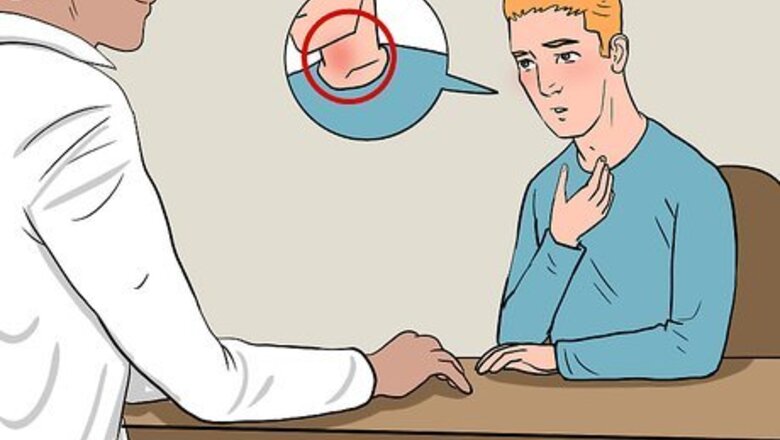
views
Getting Medical Treatment
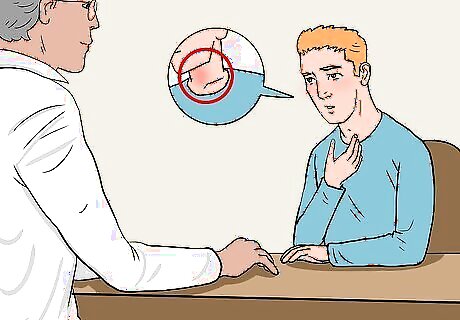
Contact your doctor if have the symptoms of silent reflux. Instead of trying to ignore your discomfort, contact your doctor about them if they last longer than a week so that you can get treated. The symptoms you may have include: Hoarseness Frequent throat-clearing Coughing Difficulty swallowing Bitter taste in your mouth Breathing difficultiesTip: Silent reflux has slightly different symptoms than the more common condition of acid reflux. For example, while the symptoms of acid reflux are typically uncomfortable and hard to miss, the symptoms of silent reflux are less obvious and can be associated with other conditions, such as colds.
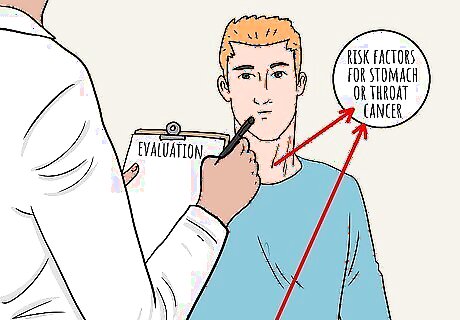
Get an evaluation if you have risk factors for stomach or throat cancer. Keep in mind that stomach and throat cancers (gastric/esophageal cancers) are very rare, but it’s important to go to a doctor for an evaluation of your potential symptoms. Go to a doctor for an evaluation if you have symptoms of silent reflux and if you either: Are over age 50 Use tobacco or consume excessive alcohol Have a neck mass Have dramatic hoarseness or throat pain Have difficulty swallowing (dysphagia)
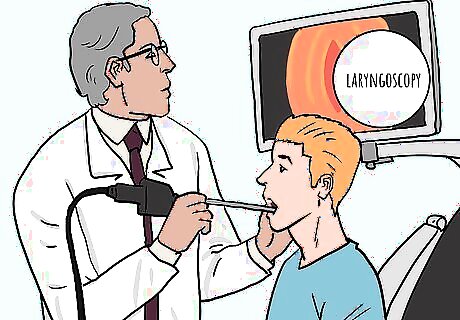
Have an exam called a laryngoscopy done to get a diagnosis. An ENT, an ears, nose, and throat doctor (otolaryngologist), will give a laryngoscopy. In this procedure, the doctor will look down your throat to check for signs of irritation. The doctor will insert a mirror or an instrument called a laryngoscope into your mouth. This won’t be painful but can be uncomfortable and may require local anesthetic.
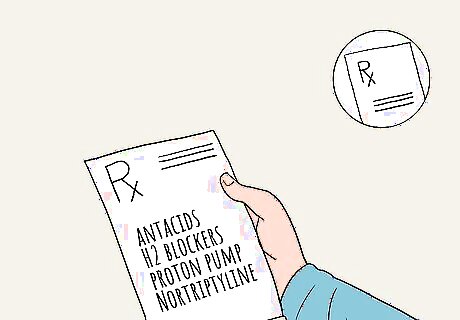
Take medication that your doctor prescribes. Once you have been diagnosed with silent reflux, your doctor will create a treatment plan for you. This will reduce the amount of contents that can flow out of your stomach. Medications your doctor may prescribe include: Antacids - typically an over-the-counter product unless your doctor prescribes you a prescription-strength antacid. H2 blockers - prescription medications that suppresses acid secretion in your stomach Proton pump inhibitors (PPIs): a prescription medication not typically recommended unless you have symptomatic GERD. Nortriptyline - prescription medication used in patients who have little response to other therapies.

Consult with a specialist if medication is not helping your condition. Talk to an otolaryngologist, commonly known as an ear, nose, and throat doctor, if your primary care doctor hasn't been able to treat your condition effectively. The otolaryngologist has specialized knowledge about conditions that impact the throat, such as silent reflux, and will be able to help you more than other types of doctors. Because ear, nose, and throat doctors have such a narrow specialization, they know the latest medications, therapies, and surgeries that can help your condition. They will work on treating the cause of the reflux, as well as the damage the condition has caused, such as damage to the esophagus.
Using Home Remedies to Reduce Symptoms

Take an over-the-counter antacid. Purchase a common antacid at your grocery store or pharmacy. Take it according to the directions on the packaging. This usually entails chewing one tablet an hour after eating or when you experience symptoms. If you are taking any other medications, such as prescription-strength antacids, talk to your doctor before taking any additional medications, even over-the-counter ones. While silent reflux won't feel the same as more common acid reflux, using an antacid can still help the condition. It will reduce the amount of stomach acid, which will prevent it from coming out of the stomach.Warning: If you need to take an antacid every day to treat your symptoms, talk to your doctor about your condition. They will be able to tell you what is causing your symptoms and can give you a specialized treatment plan.

Eat foods that neutralize or absorb stomach acid. A small diet change might help you reduce your symptoms. There are a variety of foods that are alkaline, meaning they have a high pH, so when you eat them, they counteract the acid in your stomach and make the contents more neutral. There are also foods that are great at absorbing excess acid, preventing it from flowing up out of your stomach. Prioritize eating these foods if you have silent reflux: Bananas Melons Yogurt Oatmeal Vegetables

Chew gum to increase your saliva production. If you have the symptoms of silent reflux, pull out a stick of gum and chew on it. This will increase the amount of saliva you produce, which reduces your stomach acid and prevents reflux. Consider chewing a sugar-free gum to prevent tooth decay. You can chew gum multiple times a day, basically whenever your symptoms are bothering you.
Treating Silent Reflux in Babies
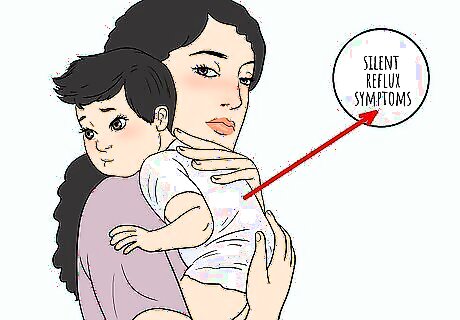
Look for signs of silent reflux in your baby. Silent reflux is relatively common in babies because the points that contain the stomach contents in the stomach, called sphincters, have not fully developed their strength yet. Look for symptoms such as: Wheezing Noisy breathing Gagging Nasal congestion Coughing Vomiting Chronic respiratory conditions, including bronchitis and ear infections Difficulty breathing Difficulty feeding Chronic spitting up Failure to grow or gain weight
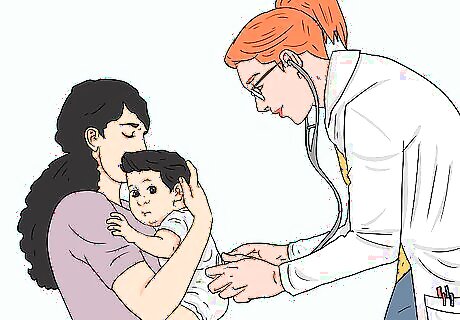
Consult with your pediatrician if you think your baby has silent reflux. This condition can be caused by a variety of factors, including normal delays in development, a hiatal hernia, or neurological disorders, such as cerebral palsy. Because the cause can vary, it's important to have your doctor assess your baby's condition. Parents often confuse normal spitting up with acid reflux. If your baby spits up a lot, you might just be overfeeding them, so try reducing the formula or milk amount. With a detailed diagnosis, your doctor will be able to give you a specialized treatment plan. This will include treatment for the underlying condition and the symptoms your child is experiencing.
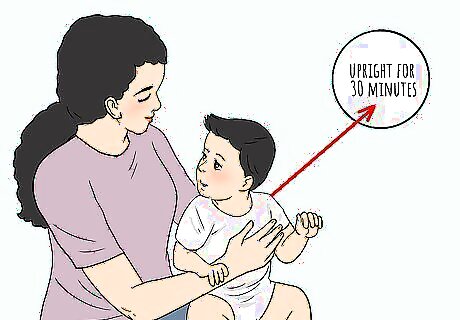
Keep your baby upright for 30 minutes after feeding them. Allow your baby to digest their food while keeping them upright. This will help prevent the baby's stomach acid from coming up out of their stomach. Even if your baby falls asleep, keep them upright by holding them on your shoulder or by putting them in a seat that keeps their head above their core.
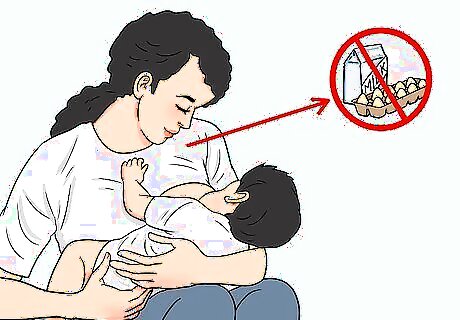
Modify your diet if your baby is breast fed. The food the breast-feeding parent eats can exacerbate the silent reflux because the nutrients are transferred to the child. To prevent this, stop eating milk and eggs for several weeks to see if that improves your baby's condition. It is common for babies to have milk and egg allergies, so these are the foods you should try eliminating first. Also eliminate highly acidic foods from your diet, including citrus and tomatoes, and add less acidic foods, such as bananas and oatmeal.

Switch your baby's formula. There are some formulas that are better for babies with silent reflux because they contain less acid-producing ingredients. Look for a hydrolyzed protein or amino-acid based formula and give it to your baby. You can do an online search for appropriate formulas or talk to your pediatrician for specific recommendations.Tip: These formulas are hypoallergenic and often advertised as food for infants with food allergies.
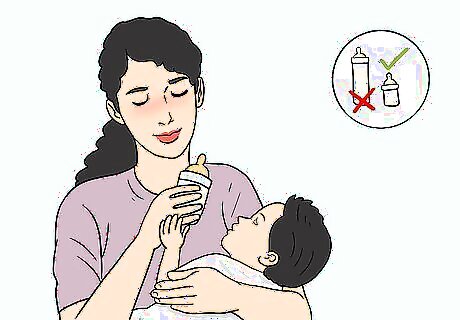
Give your baby smaller, more frequent feedings. When you give your baby a lot of formula or breast milk, they produce a lot of stomach acid in order to digest it. Feeding smaller quantities more often will create less volume of stomach acid in your baby, causing less available acid to come up out of the stomach. For example, if you give your baby 4 fl oz. (118 mL) of formula or breast milk every 4 hours, trying offering them 2 fl oz (69 mL) every 2 hours instead.

Wait for your baby to outgrow this condition. In most cases, babies outgrow silent reflux by the time they turn one. If your infant has not outgrown this condition by that time, talk to your doctor about long-term treatment plans. Long-term treatment plans can include detailed diet plans, medication, and other medical treatments.
Preventing Silent Reflex Flare Ups
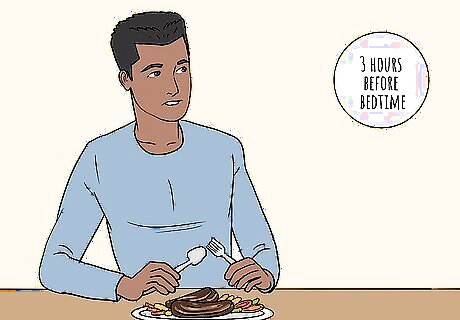
Don't eat for at least 3 hours before bedtime. Eating right before bed creates a lot of excess stomach acid that can easily come up out of your stomach when you lie down. Waiting 3 hours to go to bed after eating will allow your stomach acid to decrease before you go to bed.
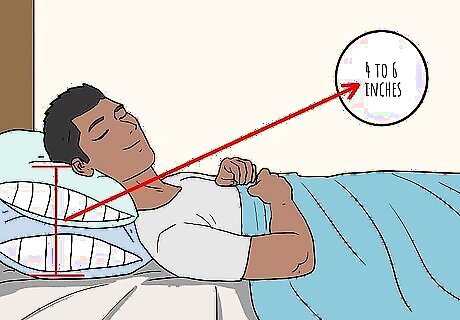
Sleep with your head propped up 4 to 6 inches (10 to 15 cm). Put an extra pillow under your head so that it is raised higher than your core. This will make it more difficult for your stomach contents to flow up out of your stomach while you sleep.Tip: You do not need to sleep sitting completely upright. Just a small amount of incline can help your condition quite a bit.
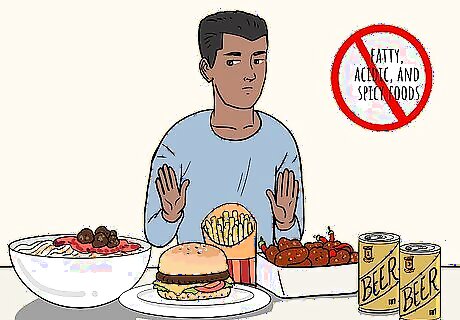
Avoid eating your trigger foods. Eating fatty, acidic, and spicy foods can create excessive stomach acid that will move up into your esophagus if you have silent reflux. Remove these foods from your diet, if you can. Additionally, drinking alcohol can increase the symptoms of your silent reflux, so avoid it if possible or at least drink in moderation.

Quit smoking, if you smoke. Smoking can increase your symptoms and increase the damage to your throat, esophagus, lungs, and sinuses. If you are serious about preventing this condition and improving your health, quit smoking as soon as possible. Talk to your doctor for recommendations for different types of smoking cessation programs.


















Comments
0 comment